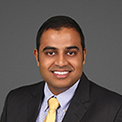Entering the World of Advocacy as an FIT
Congrats to 👇🏽 🏆 #ACCFIT & all PACers who couldn't join us for #ACCLegConf but contributed in spirit!#ACCFIT Section won 🥇Highest Participation Rate🥇w/record no. of #ACCFIT contributing to #ACCPAC #HeartPAC for PACtoberfest!
— Nosheen Reza (@noshreza) November 6, 2019
🏆 to be on display in #ACC20 #ACCFIT Lounge! pic.twitter.com/3PKexvyz7j
I never expected to be involved with the ACC beyond using ACCSAP and attending the Annual Scientific Sessions. Little did I know, this was all going to change because of an e-mail. Like many previous and current attendees, I was first introduced to the ACC Legislative Conference through my state chapter.
I filled out the application for a travel grant to the conference and wrote an essay on why I was interested. To my great surprise, I was accepted to attend.
Very little thought went into my pre-conference planning until I received the final agenda and talking points, which included decreased physician administrative burden, streamlined prior authorization, value-based payments, increased access to cardiac rehabilitation and increased funding for cardiovascular disease in South Asians.
I was awestruck by the shear breadth of advocacy that the ACC was participating in on behalf of not only our patients but also physicians and ancillary staff.
After I arrived, I found my way to the first fellow-focused session titled "First-Time Attendees." Hussein Abu Daya, MD, interventional Fellow in Training (FIT) from the University of Alabama, was regaling us with stories of his first legislative conference and why he felt compelled to continue his efforts of advocacy, despite the rigors of interventional fellowship.
Later, FIT advocate Aaron P. Kithcart, MD, role-played advocacy scenarios with C. Michael Valentine, MD, MACC, past president of the ACC, who played roles of legislative staffers with varying degrees of experience. I vividly recall feeling nervous and overwhelmed as to what I had just agreed to participate in.
Starting off #ACCLegConf strong at the FIT and EC pre-conference session! #ACCFIT #ACCEarlyCareer @ACCinTouch @Dr_AbuDaya @Nidhi_Madan9 @APKithcartMDPhD pic.twitter.com/Eh8UPlf5Mk
— Kristin West (@kristinjwest) November 3, 2019
I had recently written a review paper on cardiac rehabilitation and was selected as the advocate for bill HR3911 – Increasing Access to High Quality Cardiac Rehabilitation. During the meeting the following day, I was surprised to find that it was the personal stories told by fellows and their actual patient interactions that evoked the most emotion from our representatives.
Engaging in advocacy in this way felt as satisfying as many of my clinical experiences.
Each evening a reception and dinner was held where I met fellows across my entire state and country. While each of our hospital systems were different, it was amazing how common our fears, struggles and aspirations were. These dinners and receptions were certainly a highlight of the conference.
I am a member of many medical societies in medicine, cardiology and interventional cardiology. However, the ACC and its Political Action Committee will be the society where I plan to dedicate my time and efforts.
The conference made me realize that the ACC not only affects my practice of medicine with its guidelines and educational products, but also affects my professional career and standing in society, which is something we learn very little of during our post-graduate training.
As I eagerly look forward to the 2020 ACC Legislative Conference, I plan to spread the word of the ACCPAC (soon to be HeartPAC) mission and I whole-heartedly recommend this eye-opening experience to all my co-fellows.
